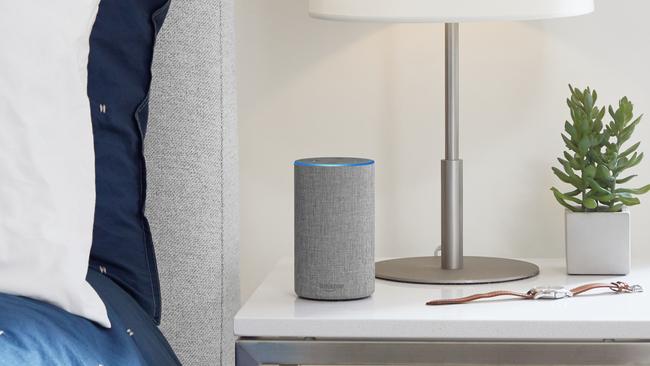Amazon’s Alexa is the ‘wedge that opens up the home’
The popularity of digital assistants is soaring, even as fears over digital snooping grows.

If advertising holds up a mirror to society, then there is much to learn from Amazon’s Super Bowl commercial earlier this week.
First, and most obvious, is the display of raw economic might. At a minute and a half, the ad was three times longer and three times more expensive than the typical Super Bowl slot. But what is $US15 million ($21m) for a swaggering corporate beast worth more than $US800 billion?
Second, the ad was all about Alexa and how the virtual assistant has become embedded in a panoply of everyday items, from the real (microwave ovens) to the imaginary (dog collars). It tried to strike a wry tone, toying with concerns over humanity’s growing dependence on supposedly life-enhancing innovations such as Alexa.
Yet the ad contrived to amplify gnawing fears over big tech. The denouement featured astronauts on a space station who inadvertently shut down the power grid after Alexa misunderstood a command. Instead of a funny bone, all Amazon managed to display was its tin ear.
That voice-controlled devices are becoming ubiquitous is undoubted. About 5.5 million British households, a fifth of the total, own gadgets powered by digital assistants, according to a report by Enders Analysis, a research firm.
The popularity of Alexa, the market leader, and rivals from Apple and Google is soaring, even as fears over digital snooping grows.
These worries are well founded. The devices lurk in the background, listening to our conversations. The companies insist that digital assistants will start recording speech and transmitting data only when they receive a wake-up prompt, but there have been enough privacy breaches to undermine such assurances.
Nevertheless, many people feel that it’s worth giving up some of their privacy so that a disembodied voice can tell them the news headlines over breakfast. Nearly three quarters of the so-called generation Z — people under 25 who grew up with the internet — would be happy owners of Amazon Echo speakers. Alexa is here to stay.
The question then becomes what exactly Amazon gets from the digital assistant. Since it launched the Echo speaker in 2015, more than 100 million devices with Alexa pre-installed have been sold. However, owners of the kit don’t appear to purchase many goods online, Amazon’s primary commercial activity. Only 4 per cent of people who own an Alexa-enabled gadget have used it to make an online purchase, versus 77 per cent who ask it to play music and the 59 per cent who seek weather updates, according to Deloitte. Amazon is not thought to make much, if any profit, from selling Echo kit and it allows other device makers to install the assistant for free.
For the tech giant, the real benefit will be in the data it will be able to collect on users. Alexa is the ultimate Trojan horse. According to Enders, the digital assistant is a “wedge that opens up the home to its media and retail services, where it makes its real money”. The information that connected home devices harvest is arguably more valuable than that gained via social media or internet searches. Amazon will be able to learn all about our movements in our homes, what we listen to, plus myriad insights from other connected domestic devices. All this will add fuel to Amazon’s growing advertising business and enable it to make more relevant product recommendations.
Propagating Alexa throughout our homes could put Amazon in a powerful position if voice replaces the screen as the way we operate all our devices.
Alexa may not be a big money-spinner now, but Amazon’s patience could be rewarded.
The Times



To join the conversation, please log in. Don't have an account? Register
Join the conversation, you are commenting as Logout